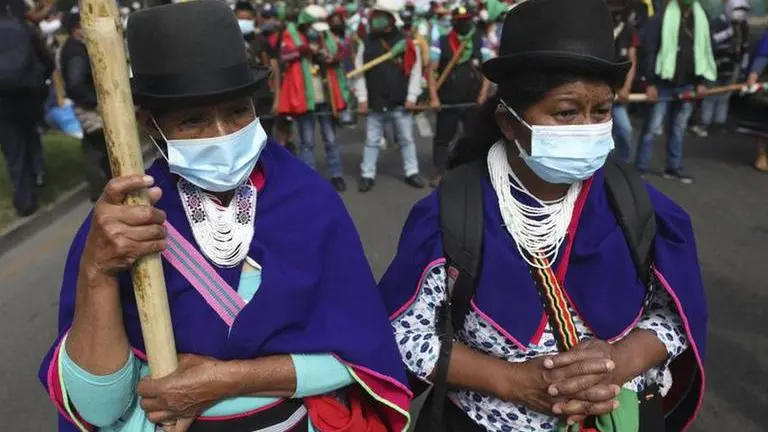Updated 19 October 2020 at 22:15 IST
Indigenous groups demand meeting with Colombia's president
Thousands of Indigenous protesters marched through Colombia’s capital city on Monday to demand a public meeting with President Ivan Duque and call for reforms they say are crucial for their survival.
- World News
- 2 min read

Thousands of Indigenous protesters marched through Colombia’s capital city on Monday to demand a public meeting with President Ivan Duque and call for reforms they say are crucial for their survival.
The group of about 5,000 protesters has travelled across the country in rural buses and pickup trucks in a procession known as the minga — an Indigenous term for joint community work or action.
The Indigenous groups, most from the country's southwest, are complaining about mining concessions and growing violence that has accompanied setbacks in implementation of a 2016 peace deal between the government and the Revolutionary Armed Forces of Colombia rebel group. That accord called for improved infrastructure and aid for rural areas.
The problems have led to a rise in conflicts involving guerrilla factions, the army, drug traffickers and illegal miners, all of whom have been accused of trampling on Indigenous rights.
Advertisement
The protests are demanding a resumption of peace talks with another, smaller rebel force, the National Liberation Army, that broke down several months ago.
The protest organizers also want the government to remove the military from indigenous areas and to improve safety for community and human rights leaders, more than 160 of whom have been killed this year in Colombia.
Advertisement
Duque has refused to hold an open meeting with the protesters, saying debates about public policy should be tackled by Congress.
The government says it already has invested $190 million, largely for education and security in Indigenous areas, to meet demands made by previous Minga demonstrations.
The minga's arrival in Colombia’s capital comes a few days before other protests planned by union leaders and student groupsas the nation’s economy struggles to recover from the coronavirus pandemic.
The president, who has two years left in office, faced large protests over his social and economic policies at the end of last year, but those tapered off this year amid the pandemic.
This story has not been edited by www.republicworld.com and is auto-generated from a syndicated feed.
Published By : Associated Press Television News
Published On: 19 October 2020 at 22:15 IST
